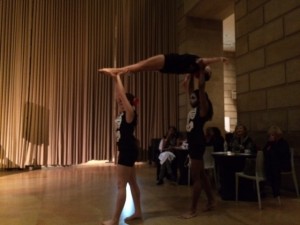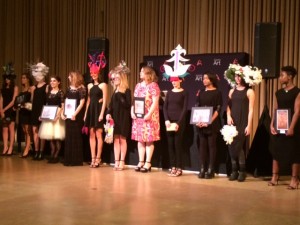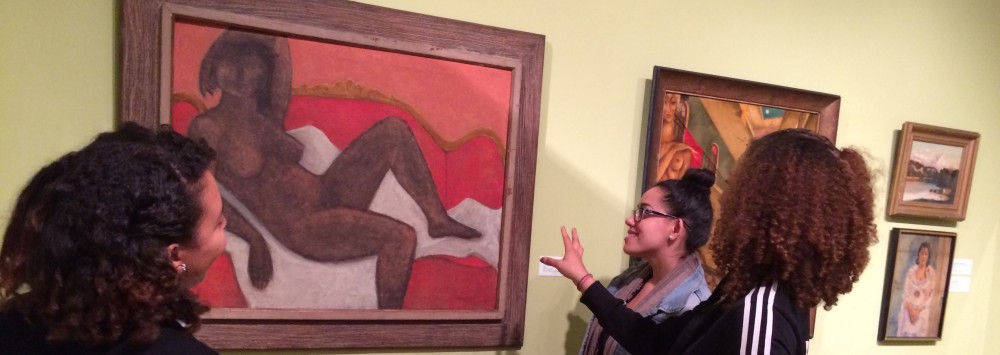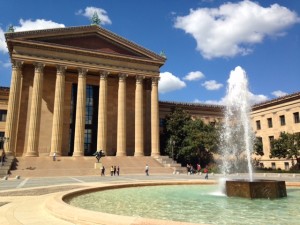Check out this article about the unique learning strategies offered by museums.
Monthly Archives: November 2015
A Visit to the PMA
Night at the (Art) Museum
What does this Bryn Mawr senior do on the Friday night before Halloween? Spend the evening at the Philadelphia Museum of Art, of course! One of the highlights of my semester has been taking a course called “The Curator in the Museum”, the first class offered by our new Museum Studies program. As a senior, I wish I had more time to explore and learn about the field, but I am happy to know that BMC and Monique Scott, the director, are developing such a unique and incredible program. Dr. Scott teaches the course I am currently in and I’ve fallen in love with the field so much I’ve already put her next course, “Museum Anthropology” on my enrollment list for next semester!
As part of our course, we visit different museums to gain a practical understanding and see how the theory we are studying in class appears in real life. Last Monday we visited the Penn Museum of Archaeology and Anthropology and this Friday, we found ourselves at the Philadelphia Museum of Art. After a highlights tour, we had the opportunity to speak with employees of the museum who worked in community outreach and curating. This element of our class is my favorite because it is so informative and an awesome opportunity to speak with the people who make the exhibits we see and admire possible.

Every Friday, the PMA offers programming called “Art After 5” centered around a theme related to current events, exhibitions, and public interest. Since it was the Friday before Halloween, they threw a Halloween Bash! Art After 5 is a unique way to draw people into the museum while creating an atmosphere that is completely different than what a patron would find during regular business hours. They had themed cocktail and snack offerings, a DJ and dance floor, and two presentations by local university students.
We decided to stay after our class to see what it was like, and I’m so glad we did. My favorite parts of the evening were the presentations inspired by pieces of art in the museum. They provided an excellent way to connect my museum experience during the day to this special one after hours. In the picture above for example, students performed a piece inspired by a Dia de los Muertos exhibit. The dancers started the dance remaining still off to the side while actors portrayed a museum guide and young man on a tour. The guide explained to the man that he should keep his eyes open because pieces of the exhibit had been rumored to come alive. As the man was writing in a notebook, one of the dancers placed herself right in front of him, scaring the young man, and causing him to run away. The dancers then came to life and performed a beautiful piece.

During the second half of the evening, fashion design students from Philadelphia University showcased hat and purses they created with each also being inspired by a work in the museum that struck them. They had to use unusual materials to create their products, so students used everything from twigs to flashing lights to chicken bones (yes, chicken bones!) to make their projects. It was so fun to hear the students explain how their hats and bags were influenced by the paintings and to see the models wearing them proudly.
All in all, it was a very fun way to spend Friday evening and a great compliment to my class experience and learning. Check out my Instagram and Twitter throughout the weekend to see how the rest of Halloween went!
Bryn Mawr Internships
Internship Opportunities are short-term work experiences that allow you to participate in a professional working environment to explore your academic and career interests. For museum internships, students can apply directly to one of the funding sources below.
(1) MUSEUM STUDIES SELF-DIRECTED INTERNSHIPS
LILAC will provide funding for four summer positions for students who wish to intern in museums, galleries or other arts organizations. These grants will enable you to explore the field of Museum Studies and enhance your education with the practical experiences of a summer internship. To apply for this summer grant, you will need to identify a museum, gallery or arts organization that will sponsor your internship. Bryn Mawr’s Special Collections is one option for this summer internship.
LILAC Funding is available for unpaid summer internships that involve at least 30 hours of work a week for 8-10 weeks (or, a minimum of 240 hours). Students MUST secure the internship before they apply. Internships should take place sometime between the end of the spring semester and the resumption of classes for the fall semester. Placements may be in any field, both in the for profit and nonprofit sectors. The key requirement is that the internship provide the student meaningful and educational experience that can contribute to one’s academic, career, and/or personal interests.
Applications received by the first deadline (March 11) will be reviewed first. Applications received after March 11 will be reviewed in April after the final deadline (April 11). Students are encouraged to submit their applications as soon as possible.
(2) MUSE INTERNSHIPS
Bryn Mawr has additional funds to support four students for summer internships related to Museum Studies. Funding is available for internships that involve at least 30 hours of work a week for 8-10 weeks (or, a minimum of 240 hours). These internships provide special opportunities to conduct museum studies internships in Philadelphia museums. They provide a specially tailored opportunity to take museum studies investigations outside of the classroom into varied facets of museum work. These internships are organized and directed by Monique Scott, Director of Museum Studies. Applicants must have prior experience in museum studies.
In the summer of 2016, there are two potential sites for internships: The Philadelphia Museum Art and the American Philosophical Society.
Philadelphia Museum of Art
This internship will provide students with an interest in Museum Anthropology to work on research projects related to the representation of culture at the Philadelphia Museum of Art. Interns will get a behind-the-scenes window into the Museum’s departments of education, community outreach and public programming. In particular, interns will work with the education department on educational programming and audience research for this summer’s “Creative Africa” exhibition.
Creative Africa is a series of five exhibitions embracing art and design from the African continent that ranges from centuries-old bronzes of the Kingdom of Benin to contemporary fashion, photography, and architecture. At the heart of the season’s offerings is Art from Africa: Looking Closely, a major exhibition drawn from the collections of the University of Pennsylvania Museum of Archaeology and Anthropology. The works of art presented encompass a diversity of materials, techniques, and visual traditions, with an emphasis on cultures of West and Central Africa. Other exhibitions will focus on traditional African textiles from the Philadelphia Museum of Art’s own collection, Vlisco fabrics and fashions, contemporary urban street photography, and the architecture of Francis Kéré. Accompanied by a dynamic schedule of related programs and performances, this season will generate conversations between past and present, tradition and innovation, and local and global concerns across African art and design.
American Philosophical Society
Curatorial interns work alongside curators in the American Philosophical Society (APS) Museum. Interns will assist curators in researching and planning the Museum’s upcoming exhibition, The Artistic and Scientific Peale Family (working title), to open in April 2017. The intern will join a small, versatile staff and will have the opportunity to see all aspects of museum work in action. Research sources include the archival papers of the Peale family, and the wide range of archival and book collections of the APS Library, the APS Museum object collections, and outside scholarly sources. Interns will have the opportunity to assist curatorial staff on the preliminary stages of the exhibition—exploring the Peale family archival collections, conducting research on the family and wider context, and choosing papers and objects for exhibition. Interns will gain skills in archival research, collections research, exhibition development, and exhibition management, and will also have opportunities to observe conservation, education, outreach and collections management work at the Museum. The APS Museum seeks an intern whose interests include cultural history, history of science, art history, early American history, Philadelphia history, material culture, and/or museum studies.
Examples of duties include the following activities:
- Assist with scholarly historical research for use in Museum exhibitions, public programs, and publications using Museum, Library and outside sources
- Identify potential collections and/or objects for exhibition
- Determine the provenance of archival or object collections
- Photograph, describe, and document artifacts
- Create and maintain databases of the exhibition checklist
- Review concept documents for exhibition development
See LILAC Muse Internships for details on the submission process. Applications are due Monday, March 21 2016.
(3) DEPARTMENT OF SPECIAL COLLECTIONS, RARE BOOKS AND MANUSCRIPTS INTERNSHIPS
The Friends of the Library have provided funding for a student to conduct a 10-week internship in the Department of Special Collections, Rare Books and Manuscripts. During the 10-week internship, the intern will explore the work of rare books and mauscript collections, which may include description and cataloging, conservation, research and writing for an exhibition, and digital reproduction and presentation of cultural items. Freshmen, Sophomores, and Juniors are eligible to apply. The intern will receive an award in the amount of $4000.
To apply, please submit the following to Marianne Hansen, Department of Special Collections (mhansen@brynmawr.edu), by Monday March 21 2016:
* 1-2 page letter explaining your interest in the position, relevant experience, and how the internship meets your academic, professional and personal goals
* Resume
* Name of one faculty member who would be able to speak about your qualifications
(4) DEPARTMENT OF SPECIAL COLLECTIONS, ART AND ARTIFACTS INTERNSHIPS
The Friends of the Library have provided funding for a student to explore working with collection objects. The 10-week internship will provide opportunities in a number of areas of special collections work, with a focus inventorying, cataloging and photographic collections. Freshman, Sophomores, and Juniors are eligible to apply. The intern will receive an award in the amount of $4000.
To apply, please submit the following to Marianne Weldon (mweldon@brynmawr.edu), by Monday, March 21 2016:
* 1-2 page letter explaining your interest in the position, relevant experience, and how the internship meets your academic, professional and personal goals
* Resume
* Name of one faculty member who would be able to speak about your qualifications
(5) EXTERNALLY FUNDED INTERNSHIPS
Students also can apply for funding directly from the particular Museum or Art Gallery in which they hope to work. Please contact LILAC or Monique Scott, Director of Museum Studies, for advice in the application process: mrscott@brynmawr.edu
Graduate Student Internships
The Department of Special Collections offers a summer graduate internship working with its collections of art, artifacts, rare books and manuscripts. The internship will provide opportunities in a number of areas of special collections work, including exhibitions, social media, web sites, cataloging projects, and digital projects. The intern’s exact assignments will depend upon the interests of the successful applicant. The position is funded by the Friends of the Bryn Mawr College Library.
Eligibility: Open to Bryn Mawr College graduate students. Experience in exhibitions or working with art, historical, or cultural collections is preferred, but not required.
Pay: $15 per hour.
Duration: The internship is for any ten week period between mid-May and late August, and is funded for up to 35 hours per week.
Deadline for applications: March 6, 2016
To apply: Submit letter of application, vita, and the names of two references to:
Eric L. Pumroy
Associate Chief Information Officer and Seymour Adelman Director of Special Collections
Special Collections Department
2nd Floor Canaday Library
Telephone: 610-526-5272
E-mail: epumroy@brynmawr.edu
Spring 2016 Courses
ANTH B271 Museum Anthropology: History, Politics, Practices This course provides an in-depth exploration of museum anthropology: the critical study of museum practices from an anthropological perspective. The course will fundamentally consider the role of museums in exhibiting culture–the politics of placing cultures on display, from living humans and human remains to cultural objects and artifacts. The course will also consider changing practices in museum anthropology, including repatriation efforts, shifting notions of heritage and identity and the emergence of community-curated exhibitions. This course complements the theoretical explorations of the museum with visits to area museums and hands-on work in Special Collections.
Psych B231 Health Psychology: (Society, and the Self – Stories at the Mütter Museum) How does society influence physical health and shape our perception of desease? What is the mind body connection and how has it been historically conceptualized? Jave identity differences/racial and gender health disparities been “overbiologized”? These are a sampling of the essential questions in students’ intellectual inquiry into Health Psychology. While Health Psychology students engage in the material via discussion, writing, lecture, film, and presentations, this course will also provide Health Psychology students access to the specimens and historical documents at the Mütter Museum in Philadelphia. This visit would allow students to engage in critical Health Psychology inquiry, accessing material which currently exists in textbook images. Students enrolled in Health Psychology will have the opportunity to engage with critical, theoretical health psychology museum scholarship.
EDU 311: Fieldwork Seminar The organizing theme for this course is “Theories of Change” and within that focus we consider multiple perspectives on change from different sectors and disciplines, including: the business sector, the nonprofit sector, academia and research, district level initiatives, counseling / spiritual based realms, change within the classroom and media / journalism. This course also includes “Museum based theories and practices of change – to the individual and to society” to this emerging list of educational sectors and areas. The museum enables us to study issues already central to the education program, including – the construction, production and dissemination of knowledge and issues of identity, access and representation – through the new and complex lens of the museum. We can together consider concepts like: the “exhibit” as “curriculum” come to life for visitors, the museum as a site for constructing or legitimating knowledge or the museum as representation of others’ histories, identities and daily lives. In addition, the students engage in five hours of fieldwork in an educational site each week and do considerable work analyzing learnings accomplished in the field through the course.
Fall 2015 Courses
HART B300 The Curator in the Museum. This course provides an introduction to theoretical and practical aspects of museums and to the links between practice and theory that are the defining characteristic of the museum curator’s work today. The challenges and opportunities confronting curators and their colleagues, peers, audiences, and constituents will be addressed through readings, discussions, guest presentations, writings, and individual and group projects.
HART B373 Contemporary Art in Exhibition: Museums and Beyond. How does the collection and display of artwork create meanings beyond the individual art object? In recent decades, enormous shifts have occurred in exhibition design as artwork projected from the walls of the museum, moved outdoors to the space of the street, and eventually went online. We will study an array of contemporary exhibition practices and sites in their social and historical contexts, including the temporary exhibition, “the white cube,” the “black box,” museum installations, international biennials, and websites. During the seminar, we will examine how issues such as patronage, avant-gardism, globalization, and identity politics have progressively brought museums and other exhibition spaces into question.
HART B374 Topics: Exhibition Seminar: World’s Fairs. Beginning in 1851, World’s Fairs were large public exhibitions intended to put the world on display for a visiting public. Exhibits displayed the technological innovations of western nations, attempting to normalize the implicit exploitation of colonized lands and people involved. This course will attend to the practice of displaying human beings, especially women, in this effort. Students will learn about this exhibition history and present it in an exhibition of their own design.Students will gain practical experience in the production of an exhibition: conceiving a curatorial approach, articulating themes, writing didactics, researching a checklist, designing gallery layout, producing print and web materials, developing programs, and marketing the exhibit. Prerequisite: At least one previous HART course at Bryn Mawr College.
Barnes Foundation College Night
OPEN ARTS COLLEGE NIGHT AT THE BARNES FOUNDATION
At the Barnes College Night, explore the Barnes collection alongside live music, performance, short stories and a few surprises, including a performance by Temple University’s Eric Montague Quintet, a dance choreographed and performed by Inger Cooper and her fellow University of the Arts alumni, and the global sounds of Worldtown. Worldtown’s high-energy performance merges live music and DJs for a global celebration perfectly in sync with the Barnes’s global art.
Access to the Barnes collection and special exhibitions included. Free; preregistration encouraged. Entrance with valid college ID only.

